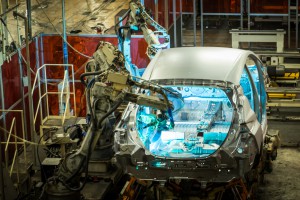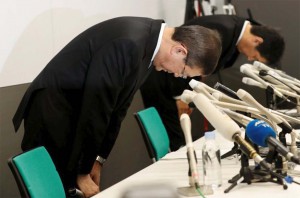Subaru acknowledged Friday it improperly inspected products sold on the Japanese market for over 30 years and will recall as many as 255,000 vehicles.
The company is the latest Japanese automaker to reveal faulty inspection practices, Nissan earlier this month reporting similar lapses. The announcement by Subaru comes at a time when the once-lofty image of Japanese industry has been severely tarnished by a raft of scandals that include rigging of fel economy numbers by Mitsubishi, the production of faulty airbags by supplier Takata, and the falsification of data by metals manufacturer Kobe Steel.
“The final inspection process is very important and we acknowledge that we did not meet requirements,” Subaru Chief Executive Officer Yasuyuki Yoshinaga at a news conference on Friday in Tokyo. “We used the same process for more than 30 years without realizing that it did not meet ministry requirements.”
(Fraud by Japanese steelmaker raises concerns for automakers. For the story, Click Here.)
Vehicles produced in Japan for the domestic market undergo rigorous safety inspections before leaving the factory, but Subaru acknowledged lapses at its main plant in the Tokyo suburb of Gunma. Over the past three decades, at least some inspections were carried out by inspectors who were not properly certified, as required by the Japanese government.
Subaru said it will recall three of its key models, the Legacy, Forester and Impreza, a move that will cost it around 5 billion yen, or $44 million. Vehicles slated for export are not covered by the inspection mandate and will not be impacted by Subaru’s announcement.
CEO Yoshinaga bowed deeply as he addressed reporters, a sign of contrition that top managers in Japan often make when their companies are found to have violated laws, regulations or even social norms.
“It’s always been my goal to make this company good,” said the Subaru chief executive. “This issue shows that we’re not there yet.”
Japanese executives have reason to be particularly sensitive right now. The country has long been known for setting high standards on quality, reliability and compliance with safety regulations. But there have been a string of embarrassing lapses over the last several years.
Nissan was accused of similar violations of inspection rules several years ago. And, earlier this month it was discovered that Japan’s second-largest automaker had continued to use uncertified technicians on some production lines.
“Our emergency measures were not enough. We were unable to change our bad habits,” CEO Hiroto Saikawa said at a briefing at its headquarters, adding that increasing inspection efficiency combined with communication issues were factors in the problem.
(For more on Nissan’s problems, Click Here.)
Compounding the problem, Nissan is one of a number of Japanese automakers that had been using steel and aluminum products from Kobe Steel. That company revealed it had falsified inspection data on a number of its products sold to automotive, rail and aerospace manufacturers.

The new, next-gen Nissan Leaf is one of the vehicles impacted by the company's plant shutdown in Japan.
Due to the various safety concerns, Nissan said on October 19 that it would shut down six of its Japanese assembly plants for two weeks to address safety issues. The carmaker also recalled 1.2 million vehicles sold over the past three years in Japan for re-inspection.
So far, there have been no indications that faulty steel wound up in use by any Japanese automaker.
The most far-reaching safety scandal involving a Japanese company in recent years involved Takata Corp. Its faulty airbags were used by virtually every automaker, large and small, triggering recalls involving at least 70 million vehicles to date. At least 17 people have been killed as a result of the problem, including 13 in vehicles built by Honda, Takata’s largest customer.
The supplier declared bankruptcy over the summer and its assets were sold to the Chinese-owned, U.S.-based Key Safety Systems.
Another scandal tarnished Japanese automaker Mitsubishi. In April 2016 it acknowledged it had rigged fuel economy tests covering minicars sold in Japan for over a decade. The revelations triggered a plunge in both sales and the company’s stock price and, with Mitsubishi faced with the prospect of bankruptcy, Nissan stepped into rescue the company but also take control.
(VW recalls another 5 mil vehicles with faulty Takata airbags. Click Here for the latest.)


